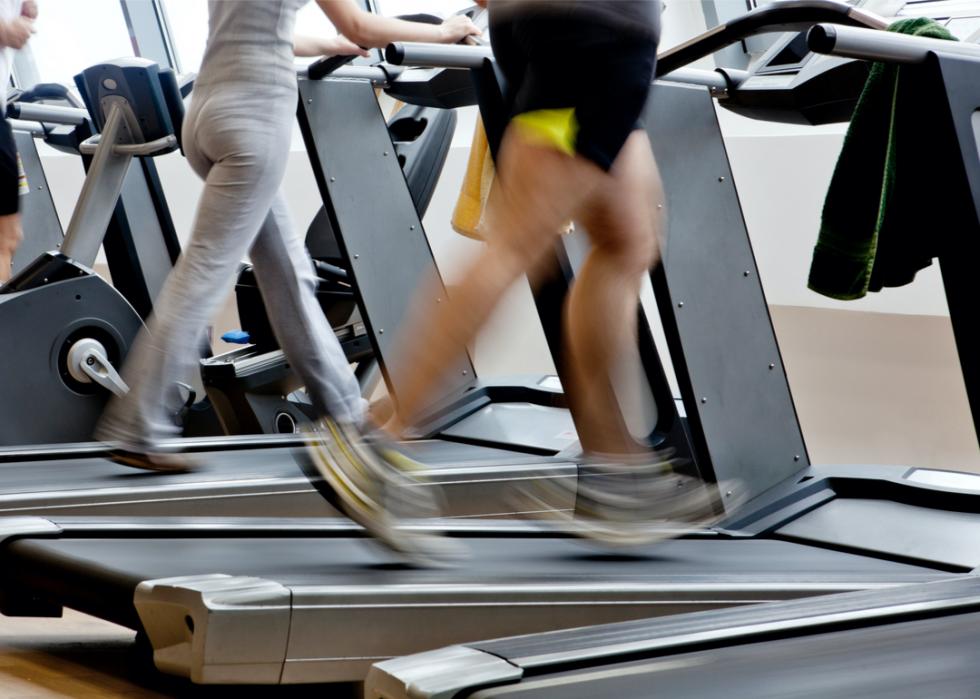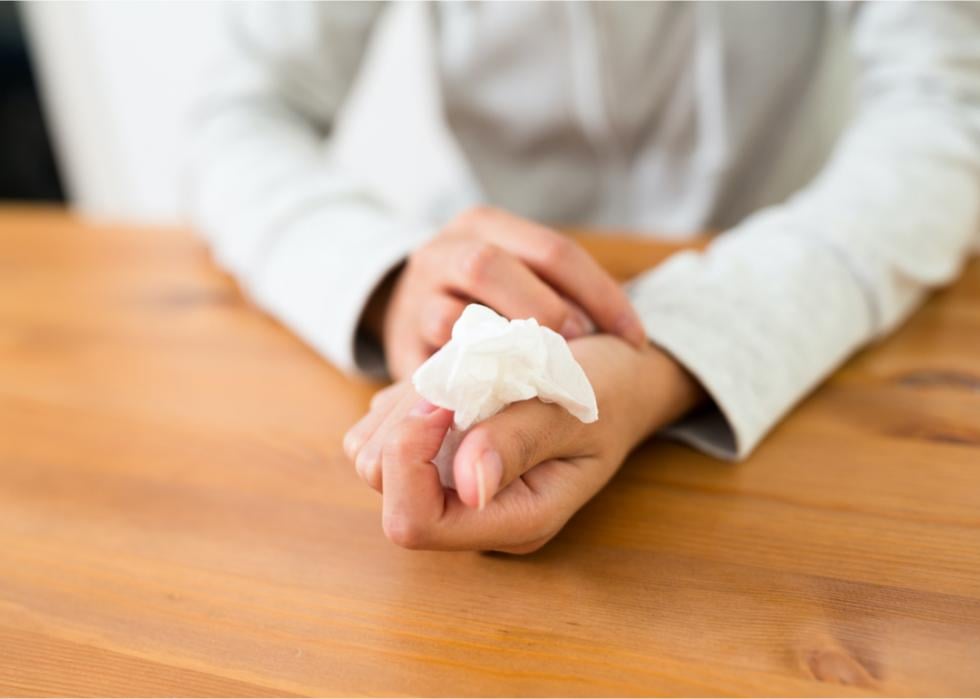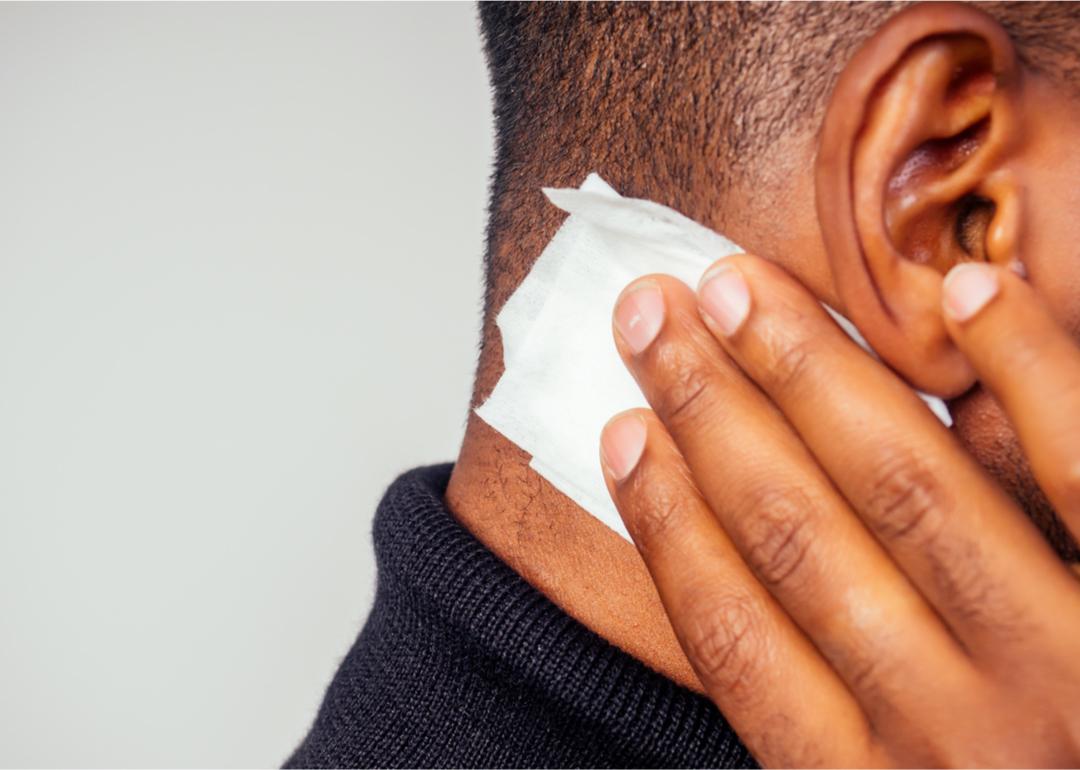This story originally appeared on Duradry and was produced and distributed in partnership with Stacker Studio.
How excessive sweating affects daily life
Everybody sweats when exposed to the right level of heat or physical strain. Sweating is an important bodily function that keeps our skin cool and our bodies at the right temperature. But for some of us, it can feel as though our sweating is constant, excessive, or beyond what’s helpful. What a lot of people don’t realize is that this amount of sweating is an actual medical condition called hyperhidrosis, and it’s estimated to affect 15.3 million people in the United States.
Although the root cause is unknown—medical professionals call that “idiopathic”—the mechanism causing the sweating is an overactive sympathetic nervous system, which is normally focused on our fight-or-flight responses. Most people experience this extra sweating in certain body areas, like their underarms, palms of the hands, soles of the feet, or their head and face. Others might experience it all over their bodies, especially if their hyperhidrosis is caused by an underlying medical condition or a side effect of a drug.
To understand how hyperhidrosis affects daily life, Duradry consulted a 2016 study published in the Archives of Dermatological Research, the oldest journal worldwide in the field of cutaneous biology and skin research. The study detailed the impact of hyperhidrosis on the daily lives of 393 hyperhidrosis sufferers in eight different categories, from work relationships, to sports participation, to social lives. Duradry ranked these categories from the lowest to highest proportion of hyperhidrosis sufferers who reported the condition impacting their life in a major or minor way.

#8. Work relationships
- Proportion of individuals impacted: 52% (16% major impact; 36% minor impact)
It’s no surprise that more than half the individuals experiencing hyperhidrosis reported that the excessive sweating was impacting their work relationships. Being frequently or constantly bothered by your own skin—30% of people, according to a 2013 survey—is a major distraction from any task at hand.
Everyday experiences such as giving presentations in front of a group can become a major source of stress for someone with an overly sweaty appearance. Worse, sweaty palms can not only make handshakes a nightmare, but can actually impair people’s abilities to handle objects like pens or tools—even causing electrical shocks to hands in the case of electricians and mechanics. In a 2017 study, a third of those surveyed said they chose certain careers specifically to avoid sweating issues in others.

#7. Sexual health
- Proportion of individuals impacted: 54% (14% major impact; 40% minor impact)
The negative effects that hyperhidrosis can have on self-esteem and confidence can dramatically impact a person’s romantic relationships and sexual health. The negative feelings that come with being inappropriately sweaty can go into hyperdrive when trying to be physically intimate with another person.
It’s not just during sexual relations that hyperhidrosis can interfere: A 2004 study found that 52% of people felt limited when trying to meet people. Likewise, 41% felt limited when trying to develop personal relationships. Excessive sweating can interrupt romantic relations, every step of the way.

#6. Sports and exercise
- Proportion of individuals impacted: 57% (23% major impact; 34% minor impact)
Sweat-inducing situations can be extra stressful for people with hyperhidrosis, since others might assume a link between sweat and physical fitness. People with hyperhidrosis can end up soaked during physical activities like sports and exercise.
In the case of palmar hyperhidrosis, some can even have trouble handling balls and other equipment. A limited ability to participate in sports and exercise can lead to worse health overall, for instance conditions linked to sedentary lifestyles.

#5. Physical health
- Proportion of individuals impacted: 60% (18% major impact; 42% minor impact)
Avoiding physical activities to avoid sweating can have a major impact on a person’s overall physical health. It’s long been understood that physical inactivity is connected with conditions like cardiovascular diseases, diabetes, cancer, high blood pressure, obesity, and more.
A sedentary lifestyle affects nearly every aspect of the body, from your circulatory system, muscles, hormones, and metabolism, to your mental health. That’s why an aversion to exercise, or just physical activity in general, can reduce overall physical health and increase a person’s risk of death from a wide range of causes.

#4. Mental health
- Proportion of individuals impacted: 72% (29% major impact; 43% minor impact)
People with hyperhidrosis are almost three times more likely to suffer from anxiety or depression. According to the 2016 study, 71% reported that excessive sweating makes them anxious, and 36% reported that it made them feel depressed.
Treatment of hyperhidrosis can help alleviate some of these mental health symptoms. For instance, a study in Sweden found that after treatment with Botox, a cohort that had started out with a baseline anxiety level of 40%, dropped to 14% in men and 24% in women. Alleviating some of the psychological effects that can come with hyperhidrosis can trickle into all other aspects of life.

#3. Emotional health
- Proportion of individuals impacted: 75% (32% major impact; 43% minor impact)
In the 2016 study, 35% of people said they’d had to “sacrifice many important things in their life” because of excessive sweating. More than half, 54%, reported they’d pay “anything” to stop their sweating, and a similar number, 53%, said they felt angry that they had to deal with hyperhidrosis while others did not.
A constant barrage of negative thoughts can affect a person’s emotional health, even when it doesn’t lead to an official mental health disorder. Some experts have suggested that hyperhidrosis patients could benefit greatly from counseling or therapy in order to lessen the personal burden of dealing with excessive sweating during all of the aspects of their lives.

#2. Sense of well-being
- Proportion of individuals impacted: 76% (27% major impact; 49% minor impact)
When your physical, emotional, mental, social, and sexual health all feel like they’re being hindered, it can have a dramatic impact on a person’s overall sense of well-being. Even when a person is experiencing some, but not all, negative impacts of hyperhidrosis, it can wear a person down.
Feeling like you can’t live a normal life because of your sweating can lead people to believe they’re not well. People who experience excessive sweating frequently report a lowered self-image, self-esteem, and self-confidence.

#1. Social life
- Proportion of individuals impacted: 77% (30% major impact; 47% minor impact)
When people avoid social situations, sports, relationships, co-workers, and more, it causes a person’s social life to suffer. A majority of people, 85%, reported that their sweating was embarrassing, and 46% reported that it made them feel alone.
Some people have even reported that they avoid social situations altogether, with three-quarters of people reporting they avoid being in public view entirely. That’s why the top facet of life impacted by hyperhidrosis is interpersonal relationships.




